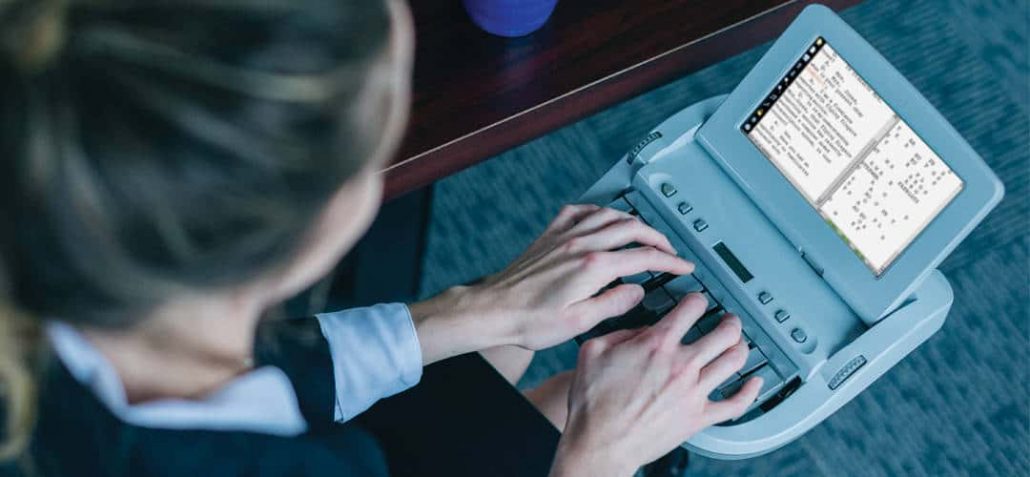Understanding the Importance of Court Reporting in Legal Services and Procedures
Court coverage plays a crucial duty in the lawful landscape, offering as the backbone of precise documents in different lawful proceedings. By providing verbatim transcripts, court reporters make sure that every testimony and disagreement is thoroughly recorded, thereby guarding the honesty of the judicial process.
Duty of Court Reporters

Along with transcription, stenotype reporter are usually entrusted with managing and maintaining the flow of procedures. They should be skillful in legal terms and have a thorough understanding of court methods to guarantee that the document reflects the context and subtleties of the dialogue. Their job may likewise expand beyond conventional courts, including management hearings, adjudications, and other legal settings where documents is essential.
Furthermore, court press reporters might supply real-time reporting, allowing prompt accessibility to records during procedures, which can be essential for the reliable administration of justice. By making sure that a specific document is preserved, court press reporters promote the integrity of the lawful process, serving and helping with allures as an essential resource for lawful experts in their quest of justice.
Significance of Precision

The duty of precision prolongs beyond mere transcription; it includes the ability to record the subtleties of speech, consisting of tone, focus, and non-verbal signs, which can be essential in understanding the context of declarations made. A specific record guarantees that all parties involved-- courts, lawyers, and judges-- have accessibility to the exact same information, cultivating justness and openness in the judicial process.
In addition, exact transcripts are important for the appellate procedure, where greater courts depend on them to examine lower court choices. Mistakes can endanger the result of an allure, possibly influencing a party's flexibilities and legal rights. Hence, the dedication to accuracy in court coverage is not just a professional responsibility but a cornerstone of justice that supports the guideline of regulation.
Sorts Of Lawful Proceedings
Covering a large array of legal contexts, court press reporters are crucial in numerous kinds of lawful procedures, each needing distinct methods and skills. Among the most usual kinds are civil lawsuits, criminal tests, and management hearings. In civil litigation, stenotype reporter capture motions, statements, and depositions, ensuring that every information is recorded accurately for possible appeals or negotiations.
In criminal trials, the role of court press reporters becomes also much more important, as they transcribe all facets of the proceedings, consisting of court selections, witness statements, and punishing stages - Court Reporting. The precision and immediacy of these records are paramount, provided the potential repercussions for accuseds and the integrity of the judicial system
Administrative hearings, usually carried out by governmental agencies, also depend on court reporters to keep main documents of procedures. These hearings can include disagreements concerning regulative compliance, employment concerns, or specialist licensing, demanding precise documents.
In addition, specialized proceedings such as arbitration and arbitration require stenotype reporter to record the subtleties of settlements and agreements. Each sort of legal proceeding presents distinct obstacles, highlighting the importance of experienced stenotype reporter in supporting the honesty of the lawful process.
Modern Technology in Court Coverage
Advancements in innovation have actually revolutionized the field of court coverage, boosting both effectiveness and precision in the transcription procedure. Typical techniques of hand-operated note-taking have been supplemented and, in some cases, changed by advanced digital devices that enhance workflows and boost precision (Court Reporting). Stenotype reporter currently use advanced steno makers geared up with real-time transcription capabilities, permitting immediate access to a verbatim account of process
Moreover, the integration of speech acknowledgment software has further changed the reporting landscape. This modern technology makes it possible for the automatic transcription of talked words, significantly minimizing the moment needed for producing main records. Furthermore, cloud-based platforms assist in easy storage and retrieval of transcripts, guaranteeing that attorneys can access vital documents from anywhere, at any type of time.
Video conferencing tools have actually also become important components in remote depositions and hearings, aiding stenotype reporter capture procedures in real-time, no matter location. The combination of these technical advancements not just boosts the accuracy of legal documents however also sustains a much more flexible and reliable legal process. As the field continues to develop, accepting these developments will certainly be crucial in meeting the growing needs of the lawful industry.
Ethical Considerations in Reporting
The assimilation of modern technology in court coverage brings with it a collection of moral considerations that experts need to navigate meticulously. As stenotype reporter progressively use electronic tools, issues surrounding this link stability, precision, and confidentiality come to the center. Shielding sensitive info is critical; reporters need to make certain that any digital records are firmly kept and shared only with accredited people.
Furthermore, the accuracy of transcriptions is essential. Using software for real-time coverage does not absolve court reporters from the obligation of guaranteeing that the last product is precise. Honest obligations dictate that any errors need to be immediately dealt with and connected to relevant celebrations.

Lastly, compliance with legal criteria and sector policies is necessary. Stenotype reporter must remain educated regarding progressing honest guidelines to copyright the trust positioned in them by the lawful system. By addressing these honest considerations, stenotype reporter can remain to offer important solutions in lawful procedures while keeping public confidence.
Final Thought
In conclusion, court reporting plays a crucial function in the legal system by making certain trusted and exact documentation of judicial procedures. The thorough work of court reporters maintains the honesty of the legal procedure and sustains the legal rights of individuals involved.
Court coverage plays a critical role in the lawful landscape, offering as the backbone of exact paperwork in various lawful proceedings.Court press reporters consistently play an essential role in the judicial procedure by producing accurate, verbatim records of lawful proceedings.Moreover, accurate records are vital for the appellate procedure, where higher courts depend on them to assess reduced court decisions.Treatment a wide selection of legal contexts, court reporters Discover More Here are necessary in various types of lawful procedures, each calling for distinct approaches and abilities. By resolving these honest considerations, court reporters can continue to offer important about his services in lawful proceedings while maintaining public confidence.